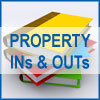A brief overview of the differences between owning property and renting |
Ownership
(Your rights and obligations as the owner.) | Renting
(Your rights and obligations as the tenant.) |
You have the right to do anything you please with the property, unless restricted by Common Law and Legislation. Restrictions may include, amongst other things, subdividing a stand, maintenance specification, minimum building standards and so on. | The owner, with regard to what you may do with the property, may restrict you. All your rights and obligations will be subject to the terms and conditions of
the Lease Agreement. |
Improving your property is your prerogative, as long as you comply with the guidelines and consents of the Local Authority, Body Corporate or Home Owners' Association. You will also need approved building plans. | Sometimes you have to ask permission from the owner to do even the smallest thing, like hammering a nail into the wall. Destroying anything on the property may cost you your deposit, or part thereof. |
You own the land surface, everything permanently affixed to the land including the plants/crops, the movable accessories and all the permanent fixtures. | You only own the goods that belong to you. It may be stipulated in the lease agreement that any fixtures you add to the property remains in/on the property when the lease has terminated. |
You are responsible for the maintenance of everything on your property. | It is the owners' responsibility to maintain replace or fix equipment like the stove, geezer, electrical wiring and so on, although the owner could stipulate in the lease agreement that you are responsible to maintain the garden, swimming pool and so on. |
If the property is mortgaged (bonded) and you are renting it out, you are obliged to maintain your repayments with the financial institution (bank). | You are obliged to pay the monthly rent agreed upon by you and the owner, which is stipulated in the lease agreement. |
You have to make sure that you are aware of all the extra costs involved in purchasing property. | Be aware of all the costs involved in renting property, other than the deposit and monthly payments. You must understand which costs are for your account and which are for the landlord's account. Check your lease agreement for these details. |
You are obliged to pay the rates and taxes imposed by the local authority, as well as any levies when renting out a sectional title property or a property in a security estate. | Depending on the lease agreement, you are not generally obliged to pay the rates and taxes but you are however responsible for the electricity bill, water usage, telephone bill and so on. |
You are able to sell the property when you wish. | You cannot sell the property you are renting, only the owner can sell it. |
Your property can be used as security to obtain finance. | You cannot obtain finance by using the property you are renting, as security. |
Packing up, selling your property shortly after buying it, and buying another one, is not always a good idea. You may lose money because of all the costs involved in buying and selling a property, i.e. estate agents' commission, registration & transfer costs, penalty costs to the bank for early cancellation of your home loan, and so on. | You are able to relocate at short notice.
Sometimes this is quite practical for a person with a job that demands moving around. |
Most financial institutions (banks) will require you to take out Home Owners Insurance and/or Life & Disability Assurance, in the event that damages occur or in the event of your death/disability. You are entitled to choose the insurance/assurance company that you insure your property and your life through. | You only need to insure your belongings, and it is your choice whether you do this or not. |
You can leave your property to whom ever you choose in your will. | When you die, this dwelling remains the property of the owner. If the landlord dies, it will be up to the owner's deceased estate to continue with the lease. |
Owning a property provides you with a sense of security and belonging. In addition, you have an asset that escalates in value, which builds your own capital wealth. | Renting a property provides you with a sense of freedom in that you do not have the responsibilities of ownership, although, paying off someone else's mortgage, does not increase your wealth at all. |
When buying a property, you would have to put down a deposit of between 10% and 50%, depending on your financial standing. You will also need to make provision for at least 8% of the purchase price for additional costs involved in purchasing property. | When renting a property, the owner usually demands that you put down a deposit, which is refunded to you at the end of the lease, as long as the property is given back to the owner in the state that you received it. This amount is usually equivalent to one months rent, although it could be more. |
Sometimes it may be a disadvantage to have your spare cash tied up in a property, unless you have a home loan facility that allows you to access any excess funds that may available in the home loan account. | If you have spare cash, it is probably readily available for other uses. |
The Interest Rate fluctuates all the time, so it is sometimes difficult to budget for unforeseen increases in your monthly expenditure, especially your home loan. | Budgeting is easier when you rent a property. Make sure that the annual escalation in payment is stated in black and white in your lease agreement with the owner. |
 In South Africa there is a general belief that
In South Africa there is a general belief that 


